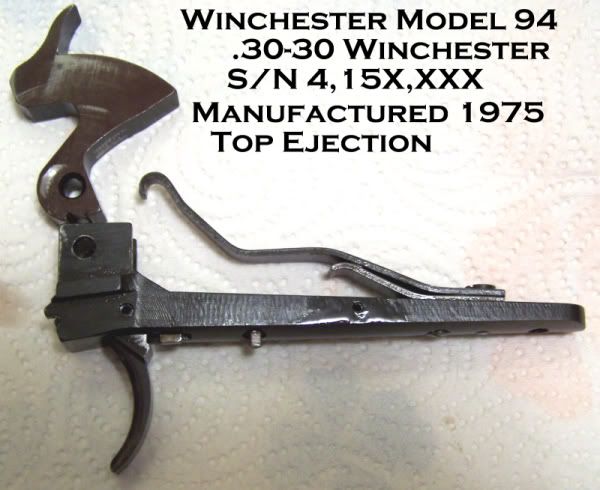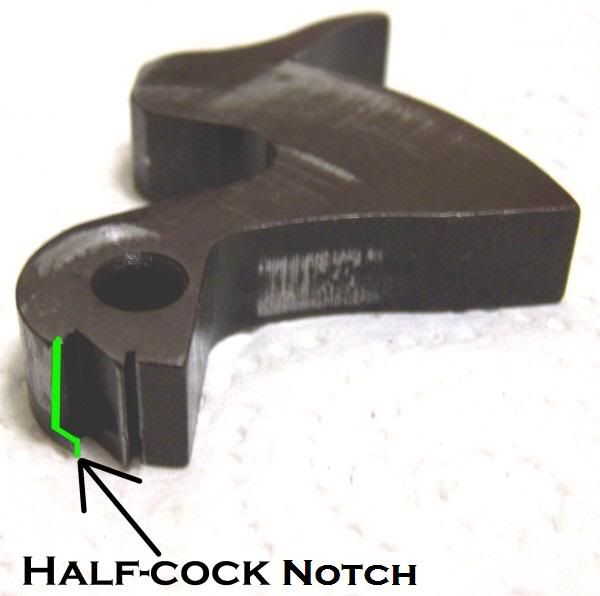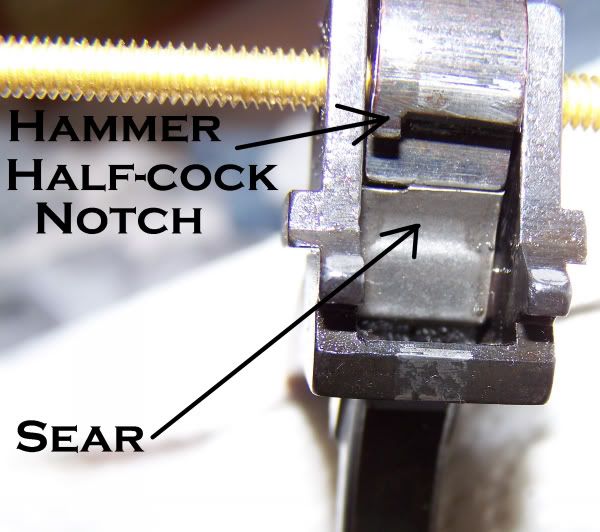I have a Winchester model 94 made in 1971. It is an exceptionally accurate rifle and I have ended the reign of many ild pigs on my farm with it.
The only problem with it is that the trigger pull is extremely light. i have been asked by others to allow them to shoot it but I am reluctant to do so because of the light trigger pull. My question is what would be involved with increasing the trigger pull weight on this gun. Can it be done by increasing the sear depth (filing) or will it require a new trigger?
Thanks in advance for any and all advice.
Winchester 94 Question
Forum rules
Welcome to the Leverguns.Com General Discussions Forum. This is a high-class place so act respectable. We discuss most anything here other than politics... politely.
Please post political post in the new Politics forum.
Welcome to the Leverguns.Com General Discussions Forum. This is a high-class place so act respectable. We discuss most anything here other than politics... politely.
Please post political post in the new Politics forum.
-
Hagler
- Senior Levergunner
- Posts: 1523
- Joined: Sun Apr 15, 2007 12:52 am
- Location: Leverland, U.S.A.
- Contact:
Re: Winchester 94 Question
caltx01,
Welcome to the forum!
Does you lower tang & spring arangement look like this one?:

Hammer, et al:


Shawn
Welcome to the forum!
Does you lower tang & spring arangement look like this one?:

Hammer, et al:


Shawn
"That's right, Billy, I'm good with it. I hit what I shoot at, and I'm fast!"-Lucas McCain, c1882.




Re: Winchester 94 Question
Shawn -
Yes, that is the same configuration as my 1971 model 94.
Yes, that is the same configuration as my 1971 model 94.
Re: Winchester 94 Question
Pull the tang and make sure the full-cock notch is clean, the sear is not broken, and then loosen the helper spring screw, tighten the securing screw for the main spring and then tighten the smaller screw for the helper spring very snug. That series of 94s had pretty light triggers. Not scary light, but nice light.
Kind regards,
Tycer
----------------------------------------------------------------
http://www.saf.org - https://peakprosperity.com/ - http://www.guntalk.com
Tycer
----------------------------------------------------------------
http://www.saf.org - https://peakprosperity.com/ - http://www.guntalk.com
- gundownunder
- Senior Levergunner
- Posts: 1449
- Joined: Fri Sep 07, 2007 12:02 pm
- Location: Perth. Western Australia
Re: Winchester 94 Question
Is it so light that it is unsafe, or is it just that it is much lighter than others you have tried?
Heck, most of us want a lighter trigger and will send our guns to the smith to have the work done, you got it for free.
Heck, most of us want a lighter trigger and will send our guns to the smith to have the work done, you got it for free.
Bob
***********************************
You have got to love democracy-
It lets you choose who your dictator is going to be.
***********************************
***********************************
You have got to love democracy-
It lets you choose who your dictator is going to be.
***********************************
Re: Winchester 94 Question
My 94 is also from the early 70's and has a really light trigger. I always figured someone paid to make it that way. It's wonderful.
___________________________________________________________________
I'm not paranoid because I carry a gun. Why should I be paranoid. I've got a gun.
I'm not paranoid because I carry a gun. Why should I be paranoid. I've got a gun.
Re: Winchester 94 Question
I like a fairly light trigger as well, but I consider this one unsafe. It takes little more than a touch of the finger to release it. Also, a sharp slap on the butt of the gun will cause the hammer to release. This is certainly not a good thing.
It's funny, but the best trigger action on any of my 7 lever guns is on my 125 year old Winchester 1873. I wish all the others were just like it!
It's funny, but the best trigger action on any of my 7 lever guns is on my 125 year old Winchester 1873. I wish all the others were just like it!
Re: Winchester 94 Question
I agree that if it fails the bump test as you've described, it's too light.
Now, it should be caught by the half cock notch when that happens as well as the trigger is not actually pulled. If not, then you've got additional problems.
If the engagement between the hammer and sear looks sound, and does not feel sticky (which would suggests it's worn through the face hardened surface into the softer/tougher core metal), then I'd try replacing the hammer spring and the trigger stop spring. Stronger hammer and trigger stop springs will increase the pull weight.
-----
All springs maintained under stress will take a set over time. How much time is the issue of debate and that depends on the metal, how it was heat treated formed and/or stress relieved, and how close to it's limits it's been stored at under tension or compression, as well as things like hydrogen embrittlement and rust.
You'll get lots of arguments on that point and someone will invariably bring out a 150 year old firearm with great springs as an example of springs lasting forever - but it's not an example that applies to most firearms. It's safer to assume that over a period of a few to several decades springs stored in tension or compression will eventually start to gradually weaken.
Coil springs in particular are heavily stressed by the forming process, so they are particularly susceptible to weakening over time. (which is one reason the 150 year old weapons with flat springs are more likely to continue working just fine.
Now, it should be caught by the half cock notch when that happens as well as the trigger is not actually pulled. If not, then you've got additional problems.
If the engagement between the hammer and sear looks sound, and does not feel sticky (which would suggests it's worn through the face hardened surface into the softer/tougher core metal), then I'd try replacing the hammer spring and the trigger stop spring. Stronger hammer and trigger stop springs will increase the pull weight.
-----
All springs maintained under stress will take a set over time. How much time is the issue of debate and that depends on the metal, how it was heat treated formed and/or stress relieved, and how close to it's limits it's been stored at under tension or compression, as well as things like hydrogen embrittlement and rust.
You'll get lots of arguments on that point and someone will invariably bring out a 150 year old firearm with great springs as an example of springs lasting forever - but it's not an example that applies to most firearms. It's safer to assume that over a period of a few to several decades springs stored in tension or compression will eventually start to gradually weaken.
Coil springs in particular are heavily stressed by the forming process, so they are particularly susceptible to weakening over time. (which is one reason the 150 year old weapons with flat springs are more likely to continue working just fine.
